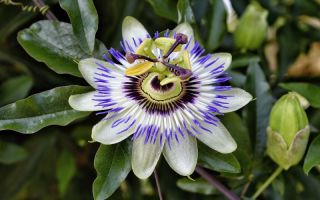Content
- 1 What it looks like and where it grows
- 2 Passion flower composition
- 3 What helps the healing properties of passion flower
- 4 Methods for the preparation and use of passion flower
- 5 The use of passionflower in medicine
- 6 Contraindications to the use of passionflower herb and side effects
- 7 Collection and procurement
- 8 The magical properties of the passionflower flower
- 9 Conclusion
The benefits and harms of passion flower are combined with each other. Before using the plant, you need to study its properties and contraindications, as well as proven recipes of traditional medicine.
What it looks like and where it grows
Passionflower, or Passiflora, is a plant from the Passionflower family, represented by more than 500 species. Looks like a herbaceous perennial or climbing shrub, with simple, whole or lobed leaves.
In July, passionflower blooms with large stellate flowers up to 9 cm in diameter. The bud of the plant consists of five petals and the same number of sepals with spur-like outgrowths in the lower part. Above them are lilac-blue threads that form the crown of a flower, and in the center are pistils surrounded by greenish-yellow stamens.
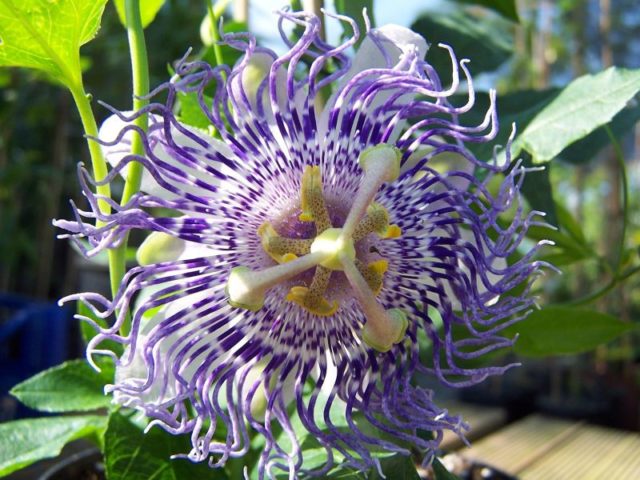
The decorative period of passion flower lasts until October. After flowering, the plant bears oval or rounded fruits of red, yellow or green shades with juicy pulp and numerous seeds.
Passionflower is native to Brazil and Peru, the Mediterranean and Madagascar, Australia and Asia. The flower is grown artificially in the subtropical regions of the Caucasus.
Passion flower composition
Photos, the magical properties of the passionflower flower and its healing effect are of interest due to the chemical composition of the plant. The green parts of passion flower contain:
- flavonoids and polysaccharides;
- phytosterols;
- alkaloids;
- B vitamins;
- glycoproteins;
- pectins and proteins;
- cellulose;
- vitamin A;
- magnesium, potassium and iron;
- coumarins;
- vitamins E and K;
- glycosides;
- selenium;
- essential oils;
- saponins and quinones;
- vitamin C.
Traditional medicine uses passion flower with caution, since in some cases it can be harmful. But in small doses, the plant has a beneficial effect on the human body.
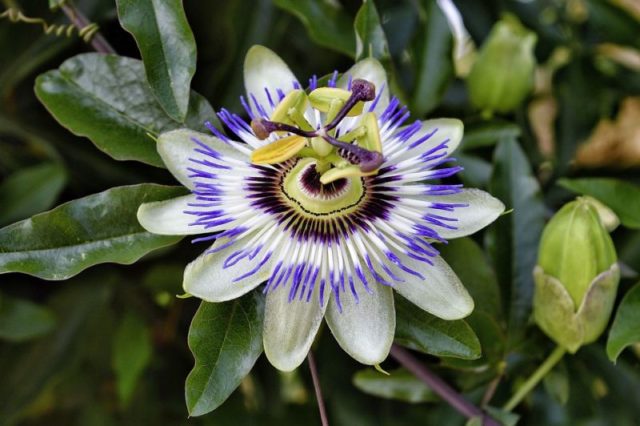
What helps the healing properties of passion flower
Medicinal passionflower is widely used in traditional medicine and homeopathy. When used carefully, the plant:
- relieves pain and eliminates migraines;
- calms the nervous system and normalizes sleep;
- improves concentration of attention;
- Benefits in chronic diseases of the central nervous system;
- normalizes hormones and helps with menopause and severe PMS;
- evens out blood pressure;
- strengthens blood vessels and increases their elasticity;
- relieves inflammation and swelling in arthritis and rheumatism;
- soothes muscle pain with myositis;
- promotes rapid recovery from injuries, operations and serious illnesses;
- prevents the development of varicose veins and thrombosis;
- relieves cravings for alcohol and drugs.
Passionflower is offered to children in the treatment of epilepsy. The plant has good anticonvulsant properties.
Indications for the use of passionflower in homeopathy
In pharmacies, you can buy ready-made products based on medicinal passionflower - tinctures, drops, solutions. Instructions for the use of passionflower extracts advise the use of drugs:
- with neurasthenia and depression;
- with increased anxiety and irritability;
- with insomnia and stress;
- with bronchitis;
- with menopause in women;
- with migraines and hypertension;
- with diseases of the heart and blood vessels;
- with increased sweating;
- with increased heartbeat;
- with digestive disorders caused by stress;
- with alcoholism and nicotine addiction.
Passionflower drops are recommended for the treatment of adolescents and infants. Adults can take tablets, capsules, and liquid tinctures.
Methods for the preparation and use of passion flower
Medicines based on the passionflower plant can not only be bought at the pharmacy, but also prepared at home. Traditional medicine offers several reliable recipes.
Passion flower tincture
Passion flower tincture is used internally and externally. Prepare a remedy according to this recipe:
- Grind three large tablespoons of dry herb.
- Pour 100 ml of quality vodka.
- Place in a cool, dark place for three weeks.
- After the expiration of the period, filter.
It is recommended to take the drug for muscle and joint pain, for colic in the intestines and epileptic convulsions. A single dosage is 20-40 drops, the product must be consumed three times a day.
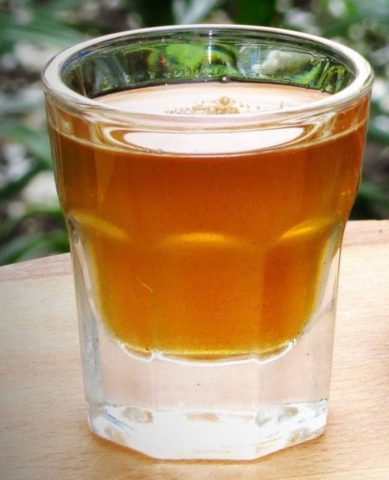
Passion flower tincture is also beneficial for insect bites, wounds and abrasions, pimples and inflammations. In the preparation, a cotton pad is moistened and wiped on the skin or put on lotions.
Infusion
For alcohol addiction, intestinal disorders and hypertension, an infusion of passionflower leaves is recommended. They do it like this:
- Dry plates are crushed in the volume of two large spoons.
- Pour raw materials with a glass of hot water.
- Leave under the lid for a day.
- Filter through cheesecloth to remove sediment.
You need to take an infusion of passionflower three times a day, a small spoonful on an empty stomach. The therapy is continued until recovery; in the treatment of alcoholism, the drug can be used for up to a year.
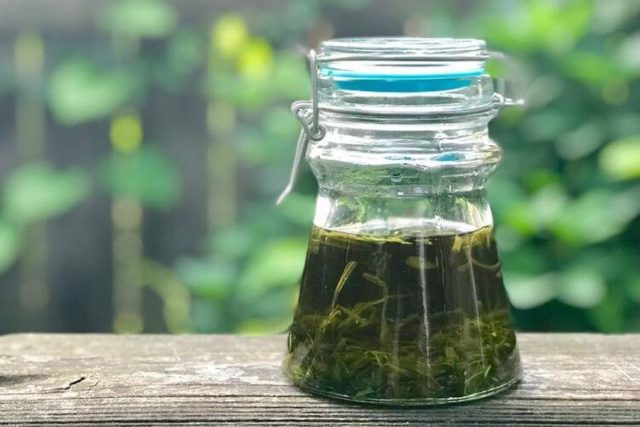
Passion flower extract
Passion flower extract is available in capsule form over the counter. The drug contains only one active ingredient - incarnate passionflower, which has a sedative, tonic and anticonvulsant effect.
It is necessary to use the remedy according to the instructions - one capsule three times a day with meals. The use of passionflower incarnate can be continued for up to a month in a row in consultation with the doctor. The main contraindication for the remedy is an individual allergy; capsules are drunk with caution during pregnancy and during feeding.
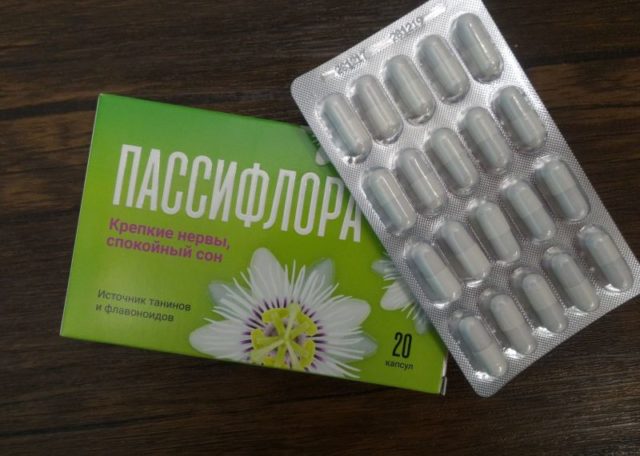
The use of passionflower in medicine
Traditional medicine uses passionflower mainly for the treatment of nervous disorders. Sometimes the herb is also used to normalize digestion and reduce blood pressure.
With menopause
Passionflower gently regulates hormones and relieves nervous tension. With menopause, for medicinal and sedative purposes, it is recommended to take a tincture of the plant. Prepare it like this:
- Measure out 100 g of dry grass and pour it into a glass vessel.
- Pour 500 ml of vodka or diluted alcohol.
- For two weeks, put in a dark place for infusion.
- Remove periodically to shake.
- Filtered when ready.
You need to take passionflower tincture 30 drops three times a day in between meals. It is advisable to continue continuous treatment for no more than two weeks.
For depression and stress
Passion flower treatment is carried out for depressive disorders and emotional overstrain. For therapeutic purposes, the following collection is prepared:
- Mix 20 g of passionflower with 15 g of anise.
- 25 g of valerian and 10 g of mint are added.
- Pour the collection of 500 ml of fresh boiling water.
- Leave covered for 20 minutes.
- Strain through a layer of gauze.
You need to drink an infusion of several plants in 50 ml each morning and evening on an empty stomach.
For insomnia
The beneficial properties of passion flower allow it to be added to relaxing and soothing baths. A solution for external use is made as follows:
- Measure out three large spoons of crushed leaves and stems of the plant.
- Pour 1 liter of boiling water and cover with a lid.
- Stand for 25 minutes.
- Strain and pour into a filled bathing container.
The bath is taken in the evening for 15-20 minutes. It is necessary to ensure that the water temperature does not exceed 37 ° C.
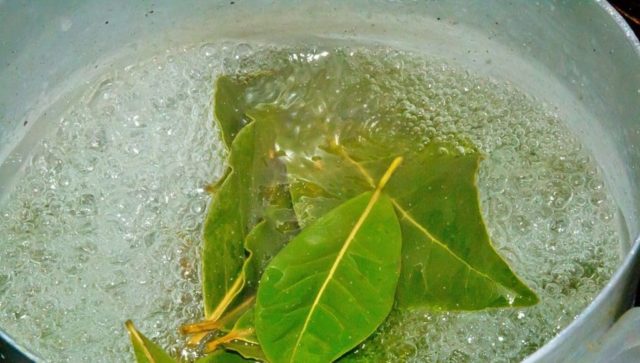
For digestive disorders
Passionflower normalizes the production of hydrochloric acid and digestive enzymes. For heartburn, stomach pains and stool disorders caused by nervous stress, it is recommended to brew a tea based on the plant:
- A large spoonful of dry grass is poured with 200 ml of boiling water.
- Leave for ten minutes under a closed lid.
- After the expiration of time, filter.
You need to drink passionflower tea in a few sips shortly before going to bed.
With alcoholism
Passionflower helps to cure alcoholism, as it evens out the emotional state and makes it easier to endure the refusal of alcohol. Traditional medicine recommends such a remedy for use:
- A few fresh leaves of the plant are finely chopped and filled with a glass of boiling water.
- Cover the container with a lid and leave for 15 minutes at room temperature.
- Pass the infusion through cheesecloth.
You need to drink a drug based on a plant three times a day, 15 ml. Treatment continues until the craving for alcohol completely disappears.
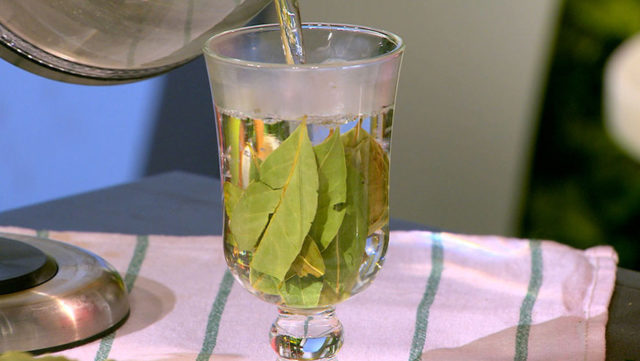
With hypertension
The vasodilating properties of passionflower help to quickly reduce blood pressure in hypertension. For medicinal purposes, the following infusion is prepared:
- Pour 70 g of dry plant leaves into a thermos.
- Pour raw materials with 1 liter of hot water.
- Screw the lid on tightly and leave to infuse for seven hours.
- At the end of the period, they are filtered.
You need to take the infusion of the plant in 30 ml each time after meals.
Contraindications to the use of passionflower herb and side effects
The benefits and harms of passionflower are closely related to each other. It is not recommended to use tinctures and aqueous solutions based on the plant:
- with arrhythmia and angina pectoris;
- under reduced pressure;
- with atherosclerosis;
- with a history of heart attacks and strokes;
- with individual intolerance;
- during pregnancy and lactation;
- with exacerbation of stomach ulcers and pancreatitis.
Contraindications and side effects of passionflower are especially often manifested in violation of dosages. If taken unchecked, herbal remedies can lead to symptoms such as diarrhea and indigestion, cause drowsiness, and decreased focus and concentration.
Collection and procurement
It is recommended to harvest a passionflower plant for medicinal use during the decorative period. Usually, from the beginning to the end of summer, three collections are carried out - at the end of spring, before flowering and at the start of fruiting.Each time, only aerial shoots with buds are cut with a sharpened knife or scissors. Passiflora roots are left in the ground so that they can give new stems.
After collecting the raw materials, the plants are dried under a canopy in the fresh air or in a warm and ventilated room. You need to lay out the stems, leaves and flowers in a thin layer so that mold does not appear. The sun's rays should not fall on the passion flower, otherwise some of the valuable substances in the composition will collapse. After all the moisture has evaporated, the raw materials of the plant are poured into paper bags and stored in a dark cabinet.
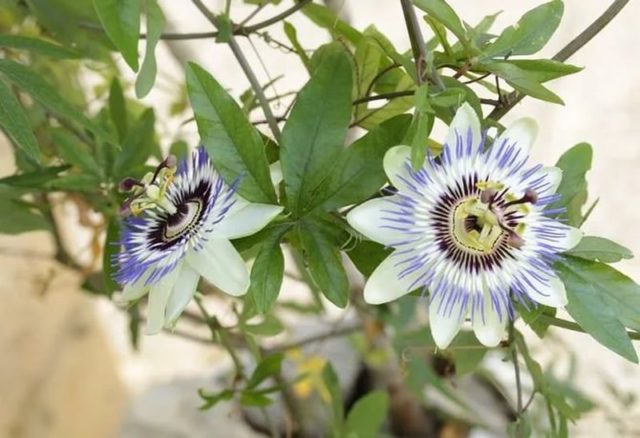
The magical properties of the passionflower flower
Popular beliefs endow passionflower with mystical properties. It is believed that the plant belongs to the category of sacred and destroys all negative energy entering the house from the outside. A beautiful flower provides family peace, drives away bad dreams, damage and the evil eye.
Passionflower symbolizes deference and loyalty. Signs claim that the presence of a plant in the house protects against adultery and prevents conflicts.
Conclusion
The benefits and harms of passion flower are closely related, but with proper use, the plant has a positive effect on the state of the body. With the help of pharmaceutical and homemade passionflower preparations, you can cope with nervous disorders and solve problems with sleep.

